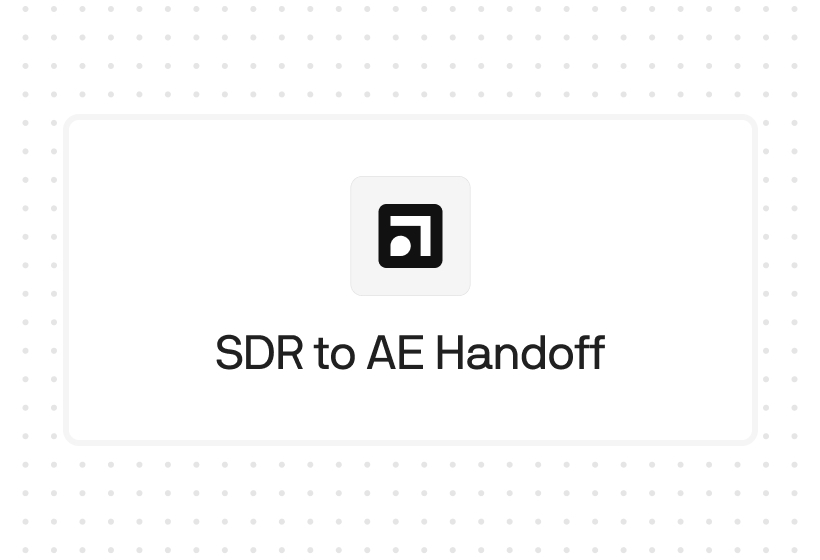Try Default

See how revenue teams automate revenue operations with Default.

Key Takeaways
B2B sales don’t happen if meetings don’t make it to the calendar—and fast! If you respond to an inbound lead within five minutes, you’re 100X more likely to book that meeting. So only the best sales scheduling software can accelerate your speed-to-lead. Read on for our comprehensive review of the best options on the market.
10 best sales scheduling software, at a glance
- Default: Best overall sales scheduling software
- Calendly: Best sales scheduling point solution
- SavvyCal: Best sales scheduling software for collaboration
- RevenueHero: Best sales scheduling software for small teams
- Clara Labs: Best AI-based sales scheduling software
- Dialpad: Best sales scheduling software for cold calling
- HubSpot: Best sales scheduling software for native CRM integration
- Microsoft Bookings: Best sales scheduling software for enterprise
- Acuity Scheduling: Best sales scheduling software for ease of use
- Square Appointments: Best POS-native sales scheduling software
What is sales scheduling software?
Sales scheduling software does what it says on the tin. It’s a software platform that automates the scheduling process, enabling prospects to book, reschedule, and cancel appointments with a single click. Rather than go back and forth to find a meeting, sales reps sync their sales scheduling software with their online calendars, and prospects can simply find a time that works for them.
More advanced sales scheduling software often includes automated routing and email reminders and follow-ups for no-shows.
How do sales scheduling tools benefit your sales team?
So bottom line, how does sales scheduling software improve your sales team’s overall performance? Here are the three of the top benefits you’ll see in your organization when you start leveraging these tools.

Save time & eliminate back-and-forth
Sales scheduling software removes the need for back-and-forth via email to get a meeting on the calendar. Instead of drawing out the scheduling process, the meeting gets booked in real time. Sales reps can spend less time on menial tasks and more time winning new business.
Accelerate speed-to-lead
Constant back-and-forth doesn’t just waste both the lead and prospect’s time. It also draws out the sales process and slows the prospect’s movement through the pipeline. Sales scheduling software helps accelerate speed-to-lead by reducing delays in getting meetings onto the calendar.
Reduce lead dropoff
A prospect’s interest in your business starts to wane within five minutes of their initial conversion. By automating bookings 24/7, you don’t have to wait for a rep to be available to get a meeting on the calendar. Many of the tools listed here include smart scheduling and routing that accounts for vacations, PTO, and other rep absences.
1. Default: Best overall sales scheduling software
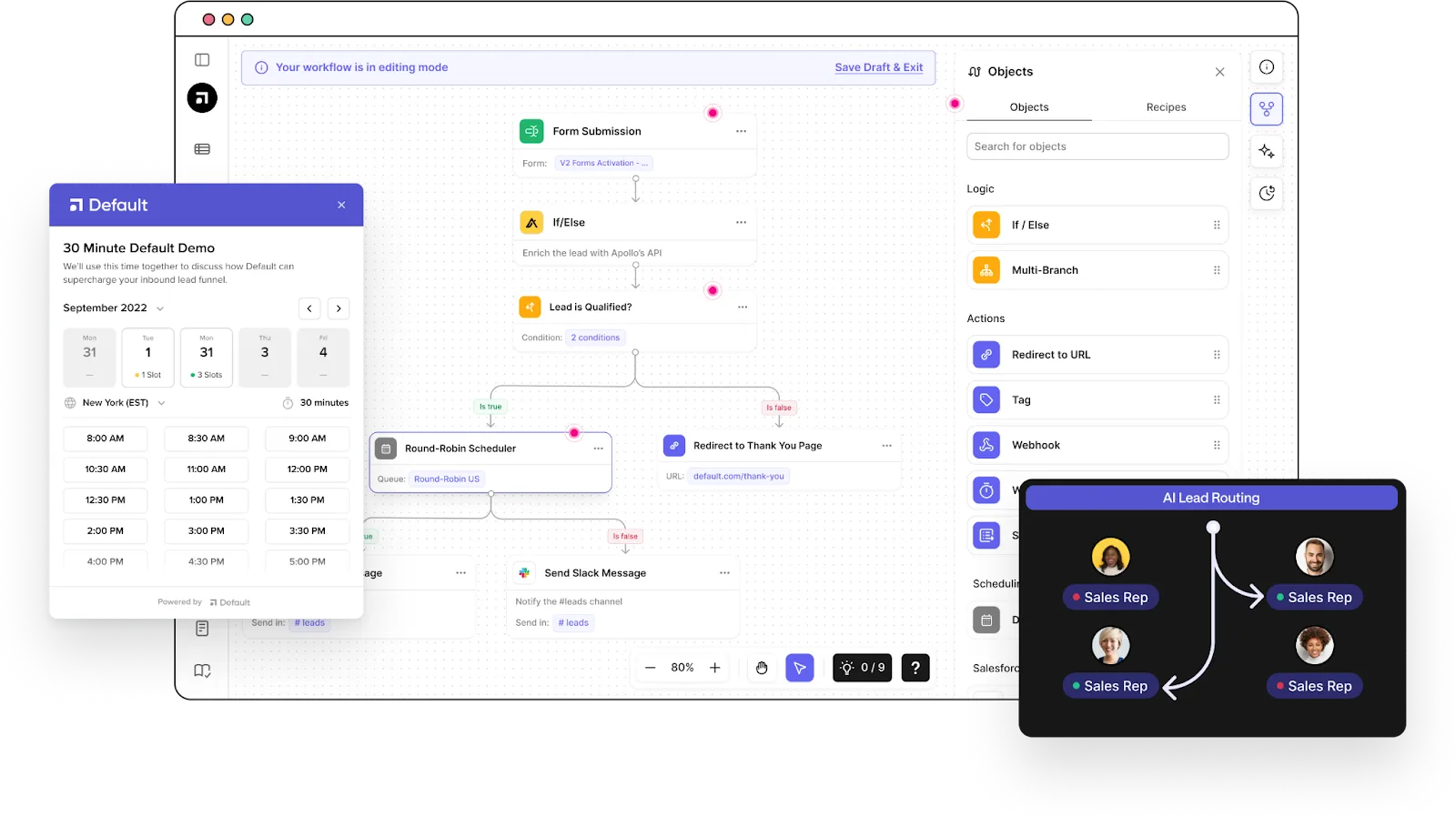
If you want to accelerate speed-to-lead and reduce meeting dropoffs while also freeing up your sales team’s time, you need to start using Default. Our suite of sales scheduling and automation features includes:
- Automated, dynamic lead routing based on custom rules and enrichment data that maximizes the chance of success (See our best lead routing tools article for more info)
- Real-time scheduling within connected calendars (including Google Calendar) with out-of-the-box sales workflow tools to send reminders and follow-ups
- Conversion-optimized forms that integrate directly into your website and increase booking rates
- Third-party integrations and tech stack orchestration to ensure seamless lead flows and reduce dropoff and revenue leakage
Default is built with the sales practitioner in mind, offering unlimited meetings, routing, and integratinos. No engineering expertise is required to set up dynamic flows, integrations, and sequences. What’s more, our platform has increased users’ speed-to-lead by 67% and qualified demo bookings by 200%.
Learn more about our sales scheduling software
2. Calendly: Best sales scheduling point solution

When it comes to sales scheduling software, no brand dominates the market quite like Calendly does. And for good reason: it was an early mover in the scheduling software space, and has a low barrier to entry for new users. Some of Calendly’s key features include:
- Unlimited meetings (one-to-one is free, other meeting types require a paid tier) via unique booking links
- Automated, one-click scheduling of various appointment types based on user availability within their preferred calendar app
- Team-based scheduling and routing to ensure all stakeholders are included in relevant meetings
- Limited automations to send reminders, follow-ups, and integrate with CRM, Google Calendar, and other technology
Despite its strengths as a point solution, Calendly relies on extensive integrations to benefit the whole sales cycle. We’ve written before about the risks that come with heavy reliance on point solutions for inbound sales. Calendly will certainly expose you to these risks.
If you need additional features beyond basic sales scheduling functionality, it's best to choose an all-in-one inbound solution like Default. You can learn more about our Default Vs Calendly comparison <-- here
3. SavvyCal: Best sales scheduling software for collaboration

B2B sales is a team-based endeavor. As such, sales scheduling software that prioritizes team-based rules and automations is automatically worth considering. We’ve put SavvyCal on this list for that very reason—it features a suite of collaboration tools many B2B salespeople will find helpful.
Here’s a rundown of SavvyCal’s most prominent features:
- Combined teammate schedules that check meeting availability for required attendees and skip scheduling restrictions for optional attendees
- Add-in contacts from external organizations—like agencies, consultants, and contractors
- Automated lead routing, including round robin meetings and sales rep prioritization models to book appointments with the right rep
- Limit meeting frequency based on custom factors
- Automatically cluster meetings to reduce calendar fragmentation
For all its powerful scheduling capabilities, SavvyCal is still a sales scheduling point solution and runs into the same risks as Calendly does above. For that reason, we’d recommend an all-in-one sales automation tool like Default.
4. RevenueHero: Best sales scheduling software for small teams

For small teams that require limited sales scheduling capabilities, RevenueHero is a great option. The platform’s intuitive lead distribution functionality enables not only instant scheduling, but speedy follow-up and automated meeting reminders.
Key RevenueHero features to point out include a meeting scheduler, automated lead qualification and distribution, reminders and other workflow-triggered emails, and integration with a range of CRM options.
RevenueHero users boast the platform’s ease of use and setup, and customizable booking pages with embedded content. The platform also uses a variety of routing techniques, including equal round robin, flexible round robin, and weighted distribution.
However, although it does offer more sales flow options than just scheduling, the platform is a point solution that has limited capabilities. See the full Default vs. RevenueHero comparison here.
5. Clara Labs: Best AI-based sales scheduling software

In terms of the uniqueness of their solution, Clara Labs probably takes the cake. This tool is less a sales scheduling software and more an AI-powered conversational intelligence that takes on the grunt work of scheduling appointments.
Certainly, Clara feels like something out of a science fiction movie more than a tool built for B2B software companies. However, by leveraging the technology in your sales flow, you can significantly cut back on the need for frontline BDRs and sales agents—freeing up your team for other revenue-generating tasks.
It’s probably obvious, but we’ll point out here that Clara is a point solution. So although it’s a creative front-person (front-robot?) for your organization, you’ll probably be better served with an all-in-one sales automation tool.
6. Dialpad: Best sales scheduling software for cold calling

Contrary to some prognosticators, cold calling isn’t dead. Far from it. But cold calling without support from scheduling tools and AI-powered insights certainly is. Dialpad offers probably the best integrated voice, text, and email platform on the market, which is why we’ve put it on this list.
Dialpad offers a range of features, but the most relevant for sales scheduling include:
- Streamlined communications within a centralized platform—automatically go from call to scheduled meeting just a few clicks
- Follow-up automatically with absent team members to ensure everyone’s on the same page
- Leverage AI-generated meeting recaps to eliminate the need for note-taking
Despite its powerful meeting capabilities and use of AI, Dialpad doesn’t handle lead routing, enrichment, qualification, or other capabilities necessary to build a robust sales process. Default presents a better, more comprehensive solution for B2B orgs.
7. HubSpot: Best sales scheduling software for native CRM integration

Let’s talk about HubSpot. Because, despite the advantages HubSpot offers in a range of categories, its meeting scheduling is, well, meh. But many B2B orgs use it because it can book meetings natively with the CRM, making it more seamless than a Zapier integration.
Yes, HubSpot includes a native scheduling tool that integrates with not only its CRM, but marketing and sales automation tools. And there are some advantages, like the ability to place integrated calendar links in your sales email templates and email signatures.
But in our experience, HubSpot’s calendar tool has a less than stellar interface and offers limited customizations on the back end. What’s more, its rigid workflow tool limits the actions you can take to follow up and engage that lead post-conversion.
Most of the premium features people love in HubSpot are available in Default. To see how Default overcomes many of HubSpot’s shortcomings, check out our full comparison of Default vs Hubspot <- here.
8. Microsoft Bookings: Best sales scheduling software for enterprise

Microsoft Office 365 is the preferred tech suite for organizations of all sizes, but especially enterprises (i.e. $100M+ in annual revenue). Its integrated functionality helps to maintain optimal security, which is a priority for businesses at that level.
For that reason, many organizations use Microsoft Bookings within Office 365 for scheduling online meetings. It includes the advanced features you’ve probably come to expect from the other platforms listed here: customized appointment details, booking requirements, Microsoft Teams integration, back-end automations, and more.
Large organizations that prefer closed systems would probably be well-served to go with Microsoft Office 365. However, if security is a concern, Default prioritizes the highest standards of security and has earned a SOC2 certification.
9. Acuity Scheduling: Best sales scheduling software for ease of use

If you work in an organization that’s—how should we put it?—less than tech savvy, you may want to trade all the bells and whistles for a platform that prioritizes ease of use. In that case, you should consider Acuity Scheduling.
Acuity Scheduling offers all the basic functionality of your typical sales scheduling software, including:
- Customized booking availability
- Automated appointment booking that takes into account time zones and multiple locations
- Build customized intake forms and follow-up sequences to keep users engaged
- Take payments directly within the scheduling app—making this a good fit for the B2C use case
Granted, this is another point solution, so we’d be remiss if we didn’t reiterate the risks of using this. But if you’re not looking to build a sophisticated, fully automated sales flow, Acuity could be a good option.
10. Square Appointments: Best POS-native sales scheduling software
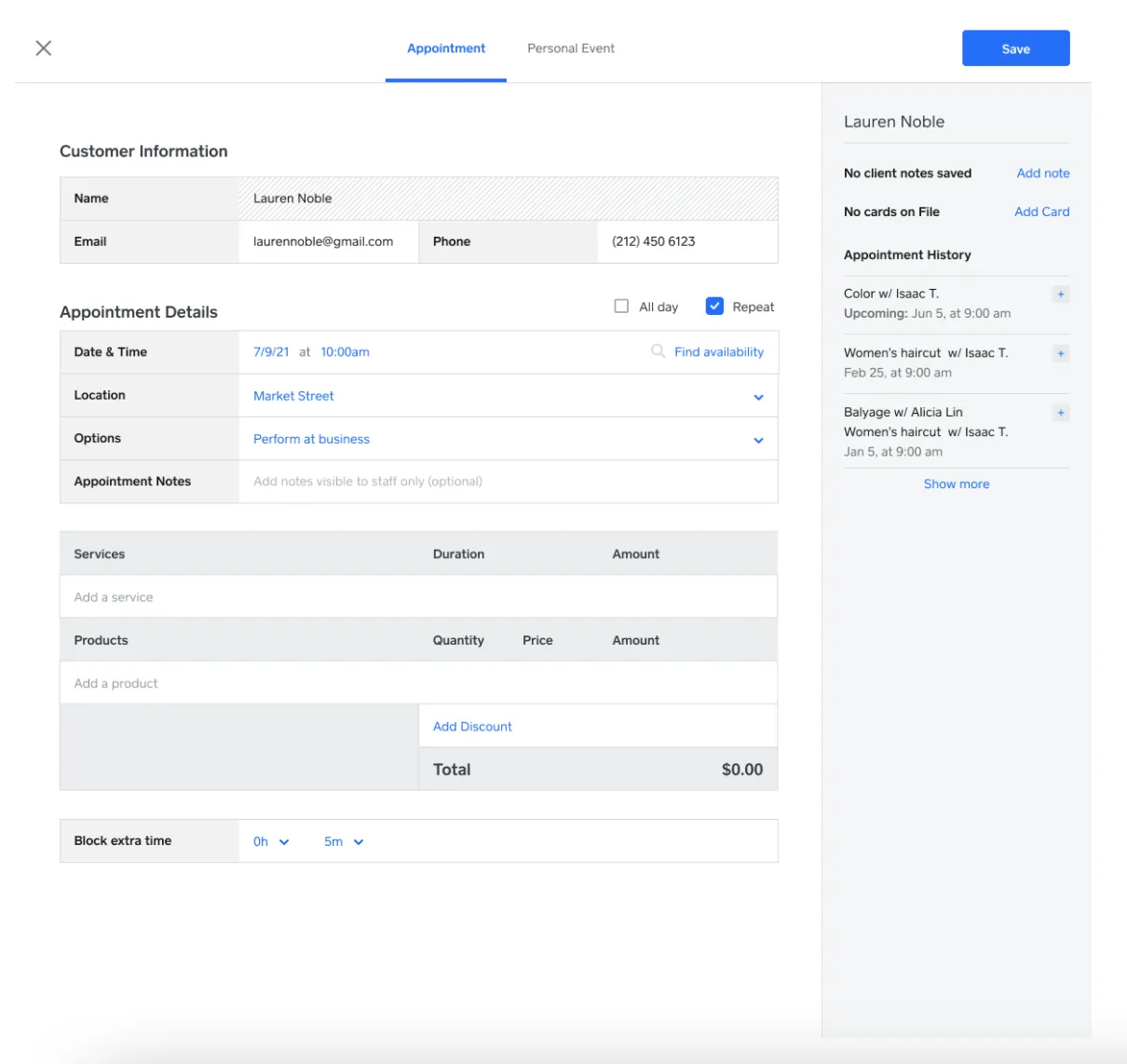
If you use a front-end POS—say, for signing up users at conferences or physical storefronts—you may want a sales scheduling software that automatically sets up appointments on the spot. For these users, Square Appointments can be a great scheduling option.
Square Appointments’s features include:
- Free customizable booking page
- Automated email and text reminders for meetings
- Built-in cancellation policies and no-show fees
- Integration with your website
- Multi-staff appointments and tip splitting
Square Appointments a good fit for B2C use cases and physical storefronts. If you’re a typical B2B software company, you’ll want to go with another solution, like Default.
How to choose the best sales scheduling software
Now that we’ve walked through the top ten sales scheduling software options on the market, here are some tips for choosing the best one for your organization:
- Prioritize integrated, all-in-one functionality or platform orchestration to avoid incurring the risks inherent in sales scheduling point solutions
- Find a platform with customizable workflows and routing rules to ensure scheduled meetings end up with the right sales rep
- Avoid platforms that require too much manual action as this slows speed-to-lead and reduces booking rates
- Align your purchase with your growth goals—don’t go with a limited platform because you don’t have a large sales team yet
Final thoughts on sales scheduling software

So there you have it: the top options for sales scheduling software. Although there are plenty of strong options here, only one offers all-in-one sales capabilities that go beyond just scheduling the meeting, but helping you turn that meeting into a paying customer.
To learn more about Default’s sales scheduling capabilities, check out our product page here.
Conclusion

Former pro Olympic athlete turned growth marketer. Previously worked at Chili Piper and co-founded my own company before joining Default two years ago.
Run revenue as an engineered system
Revamp inbound with easier routing, actionable intent, and faster scheduling








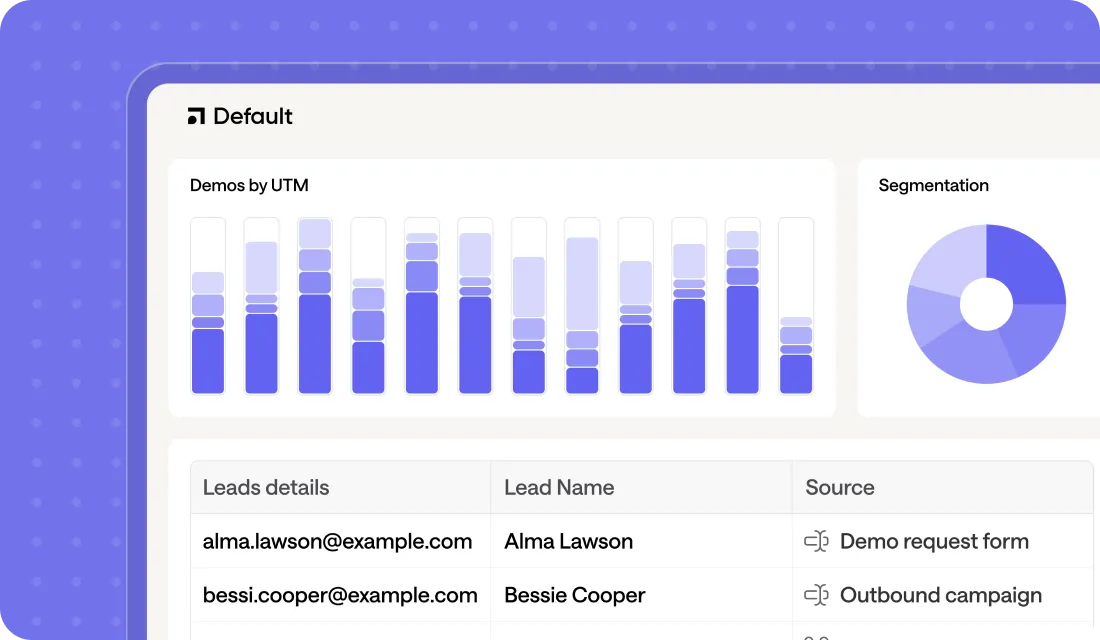
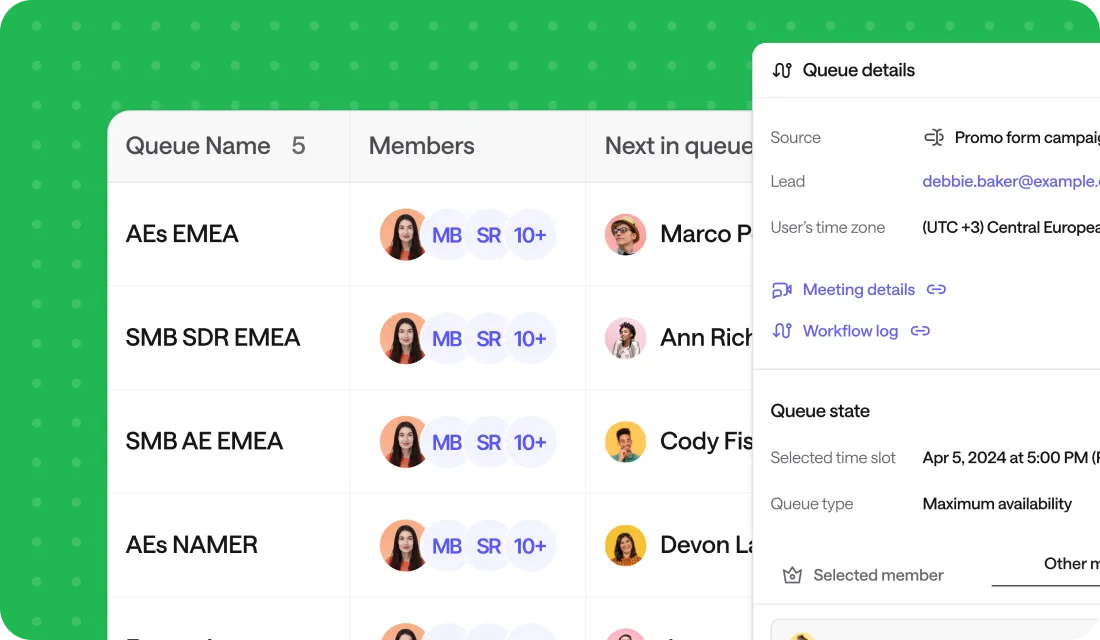




.png)

